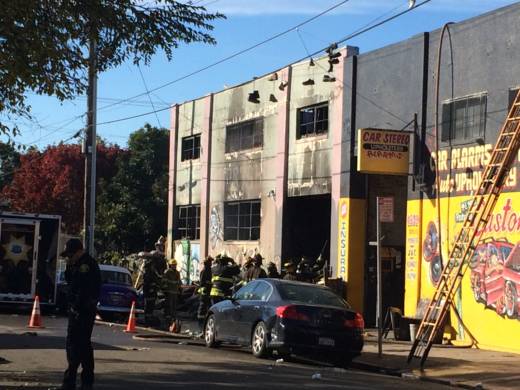"Like why we came to Oakland in the first place, because we knew we could do this," she said.
Hostettler's artist collective is located in an old garage and laundromat. She says it's relatively cheap and has lots of room for her to practice. She's pretty sure the building is up to code, but she worries that's not the case with other collectives in the neighborhood.
"So now there's the fear of -- like, if this is going to be taken away from us, like, where to next, pretty much," she said.
Her fellow barista, William Mitchell, is a drummer and electronic artist in two local bands. He does not live in a converted warehouse, but said he's always wanted to.
"There's definitely appeal. I've always been drawn to it, like the high ceilings and skylights and the atmosphere's really nice," he said.
Mitchell performs in these spaces a lot. He says his friends are talking about what might happen in the coming months.
"There's a lot of worry involved with places getting shut down. Landlords just cracking down," Mitchell said. He worries this could mean he and others will lose places to live, perform and attend events.
Mitchell and Hostettler said the tragedy at the Ghost Ship collective has made everyone more aware of what can happen when a building isn't safe. The question for many living in these types of environments is how they can make them safe.
At another warehouse, which we agreed not to name at the request of artists living there who fear eviction, artist residents say they have been living in code violations for years. Places, they say, which are not too different from the Ghost Ship.
The Ghost Ship was a two-story space filled with wooden carvings, ornate rugs and artwork. Will Urbina is a freelance videographer who used to live in a building in 2010 that shared space with a collective called Otherworld.
"It’s kind of very strange because I lived right next door to a place that certainly looks exactly like the Ghost Ship," Urbina said.
He said he began to notice a number of safety violations. In 2014, Urbina said he lodged complaints with the city of Oakland and the property owners. Urbina said it was his hope to stay living there while the owners brought it up to code, but nothing seemed to happen. After four months, he called the city inspector again.
"He said, 'Well, you know what? We have been back there, it’s bigger than you think, we’re working with the owner,'" Urbina said.
After a year, the city ultimately shut down the building. On Nov. 17, a city inspector visited the lot next to the Ghost Ship warehouse, asking to gain access to the building in order to follow up on a complaint about debris at the lot next door. Urbina said from his experience that even if the inspector had made it inside the Ghost Ship that day, it wouldn't have prevented the tragedy that took place Dec. 2.
"They would still be throwing parties for another year before they got shut down," Urbina said. "So that’s not OK. It shouldn’t take that long to stop a car crash."
At a press conference early in the week following the deadly fire, Oakland Mayor Libby Schaaf wouldn’t directly answer questions about how many similar facilities exist within the city, saying that more information would be made available in coming days.
"There will be plenty of time in the days ahead to think proactively and long term about the plethora of issues that this tragedy has raised -- everything from unsafe warehouses to Oakland’s incredible cultural community," Schaaf said.
Later that week, the city admitted it had no known evidence that any fire inspectors had ever been inside the Ghost Ship to inspect the place, at least going back 30 years.
Many in Oakland’s art community are taking action on their own now, reaching out to try to make their living and art spaces safer -- from offering free fire safety consultations to fundraising for fire extinguishers and emergency signage.
They are hoping that as the city moves ahead to try to prevent anything like the Ghost Ship fire from ever happening again, Oakland will find ways to make sure artist communities are preserved without putting more lives at risk.
Sukey Lewis and Stephanie Martin Taylor contributed to this report.
